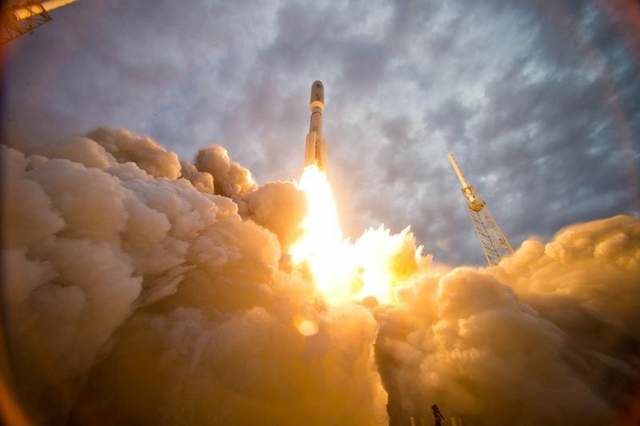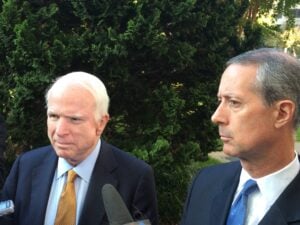McCain Compromises On RD-180s: Are Rocket Wars Over?
Posted on

Russian-made RD-180 engines propel an Atlas V rocket heavenward.
WASHINGTON: The defense bill that passed the Senate today might just end the long and bitter wrangle over Russian rocket engines. Senate Armed Services Chairman John McCain has called for an end to Pentagon purchases of the RD-180 rocket engine, charging it enriched “Putin’s cronies.” His committee unanimously passed a draft National Defense Authorization Act that allowed the military to buy nine more, nine fewer than the Air Force and industry said they needed, to help bridge the gap until an American-made replacement could be fielded. Today, McCain agreed to the double that number to the full 18 RD-180s requested by the administration and approved by the House.

Sen. John McCain
McCain declared victory nevertheless because he won a provision not in the House bill: a deadline of 2022, after which the Pentagon could no longer buy RD-180s, even if some of the allotted 18 were left. That deadline would hold the Pentagon tightly to its goal of developing a replacement rocket by 2021 and certifying it for flight by 2022. If that schedule slips — as happens all too often on high-tech defense procurements — well, too bad.
“I supported this compromise because it contains a legislative cutoff date for the use of Russian rocket engines,” McCain said in a statement praising Flroida Sen. Ben Nelson for brokering the deal. “For the first time, Senate authorizers and appropriators agreed to a legislative cutoff date for the use of Russian rocket engines in national security space launches. As a result, no space launch contracts using Russian rocket engines may be awarded after 2022, and the number of Russian engines utilized could actually be lower than the 18 provided in the House bill.” (Emphasis on “could”).
“This compromise reflects the concern shared by authorizers and appropriators alike that year-to-year litigation of this issue did not serve the Congress, US space policy, or our national security well,” McCain said, strongly suggesting he would let the matter rest henceforth if the compromise stood. “In order to prevent future fights on this issue, I look forward to working with my colleagues to ensure that this compromise is reflected in the defense appropriations bill.” It’s the appropriators who actually say what gets funded.

Sen. John McCain and Rep Mac Thornberry, chairmen of the Senate and House Armed Services Committees
With the rocket deal in place, McCain’s draft of the NDAA passed 85-13 with few substantive changes. Controversial provisions like making women eligible for the draft and breaking up the Pentagon acquisition bureaucracy sailed through because few amendments were allowed.
McCain’s own amendment to add $18 billion to total defense spending — lifting the Budget Control Act caps — failed. That brings the bill in conflict with the House draft of the NDAA, which uses what President Obama has called a veto-worthy gimmick to come up with the $18 billion. Conversely, the House NDAA doesn’t include McCain’s acquisition reforms, which the administration has also threatened to veto. The two chambers will have to come to a compromise with one eye on what the White House will do.
Subscribe to our newsletter
Promotions, new products and sales. Directly to your inbox.
